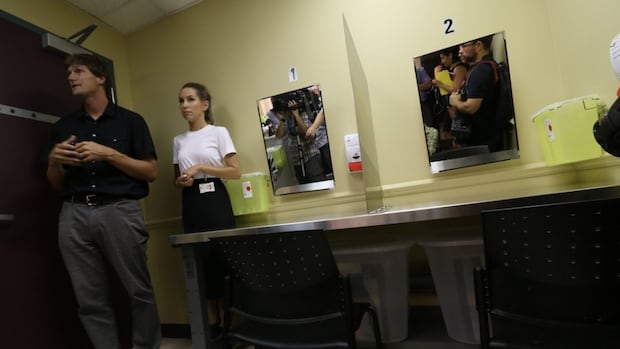OttawaA supervised consumption site in the ByWard Market has closed its doors after failing to receive a crucial provincial endorsement before a midnight deadline.Ottawa Public Health required provincial endorsement to keep Clarence Street site openThe Ottawa Public Health supervised consumption site is seen upon its opening in 2017. (Trevor Pritchard/CBC)A supervised consumption site in the ByWard Market has closed its doors after failing to receive a crucial provincial endorsement before a midnight deadline.Ottawa Public Health (OPH) confirmed Wednesday in a memo that it did not receive the endorsement from the provincial health minister and will no longer operate its supervised consumption site at 179 Clarence St. It said it’s implementing a transition plan to ensure clients can access other sites.The Clarence Street facility was one of three supervised consumption facilities left in the city, after the province forced the site at Somerset West Community Health Centre to transition to a homelessness and addiction recovery treatment hub.Supervised consumption sites allow drug users to inject or otherwise consume drugs under the supervision of trained staff to reduce the risk of overdose. They require exemptions from Health Canada under the Controlled Drugs and Substances Act to operate. The Clarence Street site’s exemption expired at midnight Tuesday. In an earlier statement to CBC News, OPH confirmed that it was only authorized to operate up to that date, and required the exemption to continue operating the consumption site.The province made the minister’s endorsement mandatory for both municipalities and public health boards under the Safer Streets, Stronger Communities Act, the same legislation that banned supervised consumption sites from operating near schools and daycares.The provincial health ministry did not respond to CBC’s request for comment about why it didn’t provide the endorsement.Rideau-Vanier Coun. Stéphanie Plante said she doesn’t expect that the closure will have a major impact on the community. (Robyn Miller/CBC)A ‘vital part’ of harm reduction effortsIn its earlier statement to CBC, OPH defended the value of its supervised consumption program.”Supervised consumption services have been a vital part of OPH’s harm reduction efforts since it was first launched in 2017,” it said. “OPH recognizes the importance of these services in saving lives, preventing overdoses, and connecting people to health and social supports.”Rideau-Vanier Coun. Stéphanie Plante said she doesn’t expect that the closure will have a major impact on the community. She said the supervised consumption site is a small component of the OPH facility on Clarence Street, which also hosts a sexual health clinic.”It wasn’t really meeting the needs of the community, both communities: people looking for the sexual health help or people looking for the harm reduction help,” she said.”People can just be served by the site that’s just up the street at Shepherds of Good Hope. I think it’s 50 metres away. There is no real loss to the community here in terms of that.”According to Health Canada data, the OPH supervised consumption site is the least visited of the three remaining sites in Ottawa. It reported 11,558 visits from March 2020 to May 2025, compared to more than 78,000 at Sandy Hill Community Health Centre and more than 300,000 for the Trailer 2.0 at the Shepherds of Good Hope.The Sandy Hill Community Health Centre, seen here in February 2024, is facing its own deadline at the end of November. (Guy Quenneville/CBC)Sandy Hill also facing looming deadlineWhile the exemption that allows Trailer 2.0 to operate is valid for two more years, Sandy Hill Community Health Centre is facing an expiration date in just two months, at the end of November.Sandy Hill told CBC it does plan to apply for a renewal. Unlike OPH, it does not require provincial endorsement since it is not a board of health. “We remain optimistic that it will be granted,” wrote Dean Dewar, director of consumption and treatment services at Sandy Hill Community Health Centre, in an email to CBC. Yet he noted that Health Canada often waits until the last minute to decide whether to renew exemptions.”At the same time, we are preparing for a range of possible scenarios to ensure that, no matter the outcome, our clients, staff, and community continue to be supported.”He said Sandy Hill has also begun conversations with the Ministry of Health about potential alternative models of service that could secure 24/7 access to consumption and treatment services in Ottawa, but he said those talks are still at an early stage.”Regardless of the outcome, SHCHC stands firmly behind harm reduction,” Dewar said. “The evidence is clear: Consumption and Treatment Services save lives, reduce harm in the community, and provide people with vital pathways to healthcare.”CorrectionsA previous version of this story suggested that Sandy Hill Community Health Centre is working toward allowing 24/7 access to its supervised consumption site. In fact, it is in conversations exploring potential alternative models of service that could secure 24/7 access to consumption and treatment services somewhere in Ottawa.Sep 30, 2025 4:19 PM EDTABOUT THE AUTHORArthur White-Crummey is a reporter at CBC Ottawa. He has previously worked as a reporter in Saskatchewan covering the courts, city hall and the provincial legislature. You can reach him at arthur.white-crummey@cbc.ca.
Wednesday, 1 Oct 2025
Canada – The Illusion
Search
Have an existing account?
Sign In
© 2022 Foxiz News Network. Ruby Design Company. All Rights Reserved.












